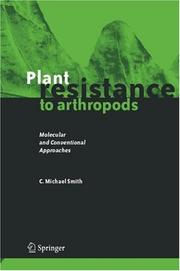| Listing 1 - 3 of 3 |
Sort by
|

ISBN: 1280459921 9786610459926 1402037023 1402037015 9048169348 Year: 2005 Publisher: Dordrecht : Springer Netherlands : Imprint: Springer,
Abstract | Keywords | Export | Availability | Bookmark
 Loading...
Loading...Choose an application
- Reference Manager
- EndNote
- RefWorks (Direct export to RefWorks)
Arthropod resistant crops reduce pesticide pollution, alleviate hunger and improve human nutrition. Plant Resistance to Arthropods - Molecular and Conventional Approaches synthesizes new information about the environmental advantages of plant resistance, transgenic resistance, the molecular bases of resistance, and the use of molecular markers to map resistance genes. Readers are presented in-depth descriptions of techniques to quantify resistance, factors affecting resistance expression, and the deployment of resistance genes. New information about gene-for-gene interactions between resistant plants and arthropod biotypes is discussed along with the recent examples of using arthropod resistant plants in integrated pest management systems.
Arthropod pests --- Plants --- Insects --- Control. --- Disease and pest resistance. --- Insect resistance. --- Host plants. --- Insect pests --- Host plants --- Insect-plant relationships --- Insect resistance of plants --- Plant resistance to insects --- Resistance of plants to insects --- Arthropoda --- Invertebrate pests --- Disease resistance of plants --- Immunity (Plants) --- Pest resistance of plants --- Resistance of plants to disease --- Resistance of plants to pests --- Plant defenses --- Plant immunology --- Insect resistance --- Disease and pest resistance --- Immunity --- Pest resistance --- Hardiness --- Agriculture. --- Botany. --- Zoology. --- Invertebrates. --- Life sciences. --- Plant Sciences. --- Life Sciences, general. --- Biosciences --- Sciences, Life --- Science --- Invertebrata --- Animals --- Biology --- Natural history --- Botanical science --- Phytobiology --- Phytography --- Phytology --- Plant biology --- Plant science --- Farming --- Husbandry --- Industrial arts --- Life sciences --- Food supply --- Land use, Rural --- Plant science. --- Floristic botany
Digital
ISBN: 9781402037023 Year: 2005 Publisher: Dordrecht Springer
Abstract | Keywords | Export | Availability | Bookmark
 Loading...
Loading...Choose an application
- Reference Manager
- EndNote
- RefWorks (Direct export to RefWorks)
Biology --- Plant physiology. Plant biophysics --- systematische plantkunde --- biologie --- moleculaire biologie

ISBN: 9781402037016 9781402037023 Year: 2005 Publisher: Dordrecht Springer Netherlands
Abstract | Keywords | Export | Availability | Bookmark
 Loading...
Loading...Choose an application
- Reference Manager
- EndNote
- RefWorks (Direct export to RefWorks)
Arthropod resistant crops reduce pesticide pollution, alleviate hunger and improve human nutrition. Plant Resistance to Arthropods - Molecular and Conventional Approaches synthesizes new information about the environmental advantages of plant resistance, transgenic resistance, the molecular bases of resistance, and the use of molecular markers to map resistance genes. Readers are presented in-depth descriptions of techniques to quantify resistance, factors affecting resistance expression, and the deployment of resistance genes. New information about gene-for-gene interactions between resistant plants and arthropod biotypes is discussed along with the recent examples of using arthropod resistant plants in integrated pest management systems.
| Listing 1 - 3 of 3 |
Sort by
|

 Search
Search Feedback
Feedback About UniCat
About UniCat  Help
Help News
News